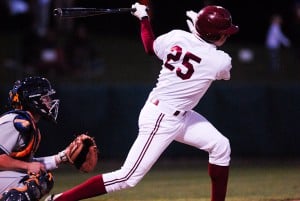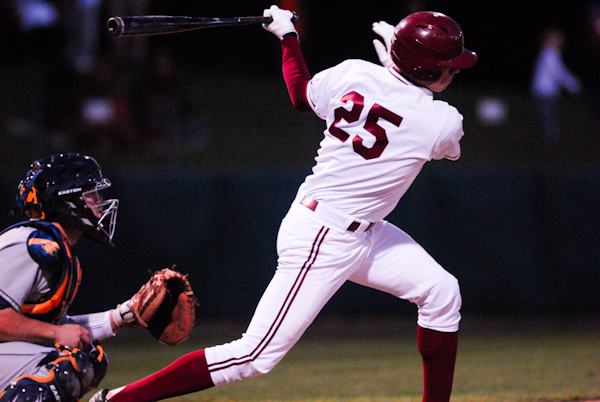
Junior Stephen Piscotty was named a preseason All-American for his hitting talents, but even though he leads the No. 17 Stanford baseball team with 50 RBI–good for No. 24 in the nation–some of his biggest contributions recently have been on the mound. A third baseman and leftfielder by trade, Piscotty pitched two innings as a freshman and has become one of the Cardinal’s most reliable relievers over the last month. He recently spoke with The Daily about his additional pitching responsibilities and how Stanford (29-14, 11-10 Pac-12) hopes to secure its postseason positioning with just three weeks left in the season.
The Stanford Daily (TSD): You just threw 83 pitches over a career-high 4.2 innings at Oregon State [on Sunday]. How’s your arm feeling?
Stephen Piscotty (SP): A little sore. My whole body’s a little sore, but it’s good soreness. It’s not pain or anything, it’s just what is expected, but I’m definitely a little tired.
TSD: Did you expect to be pitching this much coming into this season, and what conversations did you have with the coaching staff that led to you becoming one of this team’s go-to relievers?
SP: I mean, I pitched a couple of innings my freshman year so they knew I could do it. I just wanted to help the team any way I could. I threw in fall practice and did okay, and told them that if they needed me during the season, I had no problem throwing.
They started with me in there playing a position, but I took the opportunities when they came. They said they wanted to [put me on the mound], so I said, “Okay, let’s do it.” And that’s kind of been the story of the year so far.
TSD: With the designated hitter, not many college pitchers are responsible for contributing at the plate. When you have to deal with a high-pressure situation on the mound and then have to come back out and get on base yourself in the next half of the inning, how do you stay focused?
SP: It’s interesting. When you finish one role you really have to kind of slow yourself down, stop and think, “Okay, I’ve got to go hit.” You definitely have to put your mind in check to remember that you need to do both, and you need to do both successfully. Hopefully I’m learning to do that. I don’t want to say I’ve mastered that because I haven’t been doing it that long.
It’s more of a mentality thing rather than a physical one. I know the pitching mechanics from throwing before, and I know the hitting mechanics. I know how to throw, it’s just a matter of mentally being able to execute flipping back from one to the other.
TSD: Besides just your time on the mound, you also made the recent transition from third base to left field, where you played about half of your freshman season. How do you think that’s been working out, given some of your fielding struggles early in the year?
SP: The transition has helped get a good bat in the lineup, in [freshman third baseman] Alex Blandino. Situations occurred that landed me in left field, and that’s what coach needed from me. I’m a guy to respect whatever decision the coach makes. I’m happy in left field, I enjoy running around in the outfield and getting to show off my arm a little bit. To me, hitting is the most important thing and anything I can contribute on defense I’m happy to do, whatever position I’m at.
TSD: After Lonnie Kauppila went down with his injury, the infield was retooled a bit with some younger players, guys like Blandino and [sophomore second baseman] Brett Michael Doran, getting in regularly. What have you thought of their efforts?
SP: I think they’ve done a phenomenal job. They’ve been really consistent on defense, and both have had really good at-bats. Obviously, Blandino, with the six home runs to start his season, did really well, and Doran is a tough out. They’ve really stepped up, and that’s all you can ask for from guys like that who weren’t in the lineup every day: just to jump right in and start producing. It’s a very good thing for our team and they’ve been the reason for a lot of our success.
TSD: In conference play, this team is pretty much in the same position it was last year, with about a .500 record through 20 games and sitting in fifth in the Pac-12. How do you duplicate your strong finish a year ago, when you won four of your last five conference games?
SP: This is crunch time, and our whole team knows that. I think the mentality is that we need to win every game down the stretch here in order to put ourselves in a good position. We went on the road last year to North Carolina [for the Super Regional], and we know how tough it is to win on the road. These games are kind of in preparation, to make that a little easier on us. It’s important in getting us to Omaha, so we know that every game from now on is an absolute must-win.
TSD: You now have only three weeks to make up 3.5 games on conference leader Oregon. Is winning the conference still seen as a viable goal, and what are you going to have to do to avoid another series loss like the one you sustained this weekend?
SP: I think it’s taking each game one at a time, just knowing that the Pac-12 title is important but it’s not as important as getting to Omaha. That’s the goal: winning a national championship. It’s always been the goal to get there. We’re not so much concerned with catching Oregon and Arizona as we are with getting ourselves in good position for the postseason to make a run at it, have some fun and hopefully get to Omaha.
